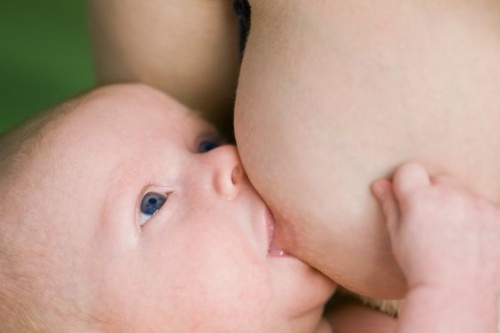The First Days at Home with a Newborn Baby

After 9 months of waiting, you finally have your baby in your arms. However, doubts invade your mind. You are overcome with a sort of fear of the changes that are to come. That being said, the best thing you can do during the first days of having your newborn baby at home is to keep calm and enjoy this moment that is so unique and special.
The first days at home with your newborn baby tend to be very upheaving for the entire family, since everyone in the home will have to adapt to a new routine. However, we advise you to face this situation calmly and without fear.
What are the first days like? And how should you handle the arrival of this new family member to the home?
Your baby’s first days at home: The adaptation begins
Although the first days with a newborn in the home can be very disconcerting for new mothers, there is no reason to panic. Tending to your newborn’s behavior is essential, and she is just starting to get used to the “outside” world; Oxygenation and nutrition no longer pass through the umbilical cord, and the protection of the uterus has disappeared.
Relax! Not only do you have the support of your family and medical personnel, but every woman possesses the best tools to take on this time period: Instinct, affection and a mother’s common sense. Below, we will share some indispensable advice for the first days after bringing your new addition home from the hospital.
Feeding your baby
Newborns have very tiny stomachs, which means they feed in very small amounts, and very frequently. Many newborns will demand to be fed every two to three hours, whether it be by breastfeeding or a bottle. Others may become hungry more often.
With your baby in your arms, it will be very easy to realize if she is hungry, as she will start to let out little groans that will turn into loud crying. There are more subtle signs as well; your baby will suck on her hands, move her mouth as though she were nursing, and turn her head in the direction of your chest.
Hiccups, burps and vomiting: What’s normal?
Some babies need to be burped quite often, while others do this on their own and with hardly any help at all. You simply need to evaluate his behavior at feeding time; if your baby becomes restless or irritable after feeding, then he probably needs to be burped.
Don’t be alarmed if your child gets the hiccups or vomits; this is normal and isn’t bothersome for your little one. Also, don’t be afraid when your little one regurgitates or spits up some milk while he is feeding, or shortly after.
That being said, if your newborn vomits excessively and arches his back while crying, especially at night, then you should consider the possibility that he is experiencing reflux. Reflux is common in newborns and improves when the baby gains control of his head muscles.

Let’s talk about diapers
Depending on what condition a diaper is in, it may cause your baby discomfort or even diaper rash. If your baby is drinking breast milk, then she may urinate at least five times a day. If you feed your baby with baby formula, she will urinate more often, perhaps wetting some ten diapers a day.
At the same time, newborns who breastfeed tend to soil more diapers than babies who are bottle fed, due to the fact that baby formula takes longer to digest. Therefore, you should keep track of how often your little one dirties her diapers, and speak about this with your doctor.
While the first times your baby goes poop, it will be thick and blackish in color (meconium), during the first days at home, you may begin to find her diapers with runny waste that is greenish, brownish, or mustard color. If your baby breastfeeds, her poop may be more lumpy. If she is bottle fed with formula, then her poop may be more pasty, and vary in color.
What should I do when my baby cries?
The fact of the matter is, your baby is going to cry. This is an unavoidable and unpreventable reality, since it is his only method he has of expressing his discomfort of unmet needs. You will note that during his first fews days at home, your baby will be more calm and will spend most of the time sleeping.
However, several weeks later, your baby will reach a point when he will cry an average of about 2 hours per day. The good news is that, over time, you will start to identify the reason behind your child’s crying.
But, if you are a first-time mom, you can start by checking if your baby’s crying is due to the need for a diaper change, or because he is tired or maybe just uncomfortable. If your baby doesn’t seem to be crying for any of these reasons, then he may be crying because he has been exposed to too much stimulation.
The controversial issue of a newborn’s sleep…
During her first few days of life, your newborn won’t sleep for long periods of time, since she will wake up often to be fed. However, if you add up all of the short naps, your little sunshine will rest between 16 and 18 hours a day.

The carseat, the cradle, the baby carrier, and your arms; most babies feel more comfortable and protected when they are in “small” spaces that simulate the mother’s womb.
Newborn babies love to be swaddled in blankets or sheets that reproduce their natural habitat where they spent their first 9 months. These tight spaces also help them avoid being startled or jumping due to their natural reflexes.
Bath time
You’ve probably been advised to put off your baby’s first bath until his umbilical cord falls off. Just the same, you can wash your baby during the first days at home with a sponge bath. You can also use wet cloths to clean between the folds of skin on your baby’s body.
The last part that you should wash is the diaper area, applying vaseline or other cream that helps dry up any rash or irritation (dermatitis). Also, don’t be alarmed by any scaling, erythemas, scabbing or dry skin – all of this is normal.
Caring for your newborn baby’s belly button is essential, and you should clean it each time your change your little one’s diaper. Your baby’s belly button should remain covered with sterile gauze, but you must observe it regularly and make sure the area stays dry and clean.
Changes in your own body
Your body will go through major changes after you give birth.With the arrival of your child, you will begin to produce milk. But first, your body will produce a liquid called “colostrum”, which is full of antibodies and has a more yellowish color than breast milk. When your breasts begin to produce milk, you will likely feel like they are full, firm and heavy.
Nursing doesn’t just mean feeding your child. It means connecting in a unique way with this life that came out of your womb. Just the same, when it comes to breastfeeding during the first days after your baby’s arrival, some difficulties may arise.
Though it may be a challenge, you should make sure that your bab latches on correctly to both of your breasts.
We could write an entire chapter about caring for your nipples during the first stage of breastfeeding. Nursing tends to produce a great deal of pain and sensibility in the skin on and around the nipples, which often become chapped.
In order to find relief, you can apply purified lanolin cream or calendula, or even rub your own milk on your nipples to moisturize the chapped skin.
After 9 months of waiting, you finally have your baby in your arms. However, doubts invade your mind. You are overcome with a sort of fear of the changes that are to come. That being said, the best thing you can do during the first days of having your newborn baby at home is to keep calm and enjoy this moment that is so unique and special.
The first days at home with your newborn baby tend to be very upheaving for the entire family, since everyone in the home will have to adapt to a new routine. However, we advise you to face this situation calmly and without fear.
What are the first days like? And how should you handle the arrival of this new family member to the home?
Your baby’s first days at home: The adaptation begins
Although the first days with a newborn in the home can be very disconcerting for new mothers, there is no reason to panic. Tending to your newborn’s behavior is essential, and she is just starting to get used to the “outside” world; Oxygenation and nutrition no longer pass through the umbilical cord, and the protection of the uterus has disappeared.
Relax! Not only do you have the support of your family and medical personnel, but every woman possesses the best tools to take on this time period: Instinct, affection and a mother’s common sense. Below, we will share some indispensable advice for the first days after bringing your new addition home from the hospital.
Feeding your baby
Newborns have very tiny stomachs, which means they feed in very small amounts, and very frequently. Many newborns will demand to be fed every two to three hours, whether it be by breastfeeding or a bottle. Others may become hungry more often.
With your baby in your arms, it will be very easy to realize if she is hungry, as she will start to let out little groans that will turn into loud crying. There are more subtle signs as well; your baby will suck on her hands, move her mouth as though she were nursing, and turn her head in the direction of your chest.
Hiccups, burps and vomiting: What’s normal?
Some babies need to be burped quite often, while others do this on their own and with hardly any help at all. You simply need to evaluate his behavior at feeding time; if your baby becomes restless or irritable after feeding, then he probably needs to be burped.
Don’t be alarmed if your child gets the hiccups or vomits; this is normal and isn’t bothersome for your little one. Also, don’t be afraid when your little one regurgitates or spits up some milk while he is feeding, or shortly after.
That being said, if your newborn vomits excessively and arches his back while crying, especially at night, then you should consider the possibility that he is experiencing reflux. Reflux is common in newborns and improves when the baby gains control of his head muscles.

Let’s talk about diapers
Depending on what condition a diaper is in, it may cause your baby discomfort or even diaper rash. If your baby is drinking breast milk, then she may urinate at least five times a day. If you feed your baby with baby formula, she will urinate more often, perhaps wetting some ten diapers a day.
At the same time, newborns who breastfeed tend to soil more diapers than babies who are bottle fed, due to the fact that baby formula takes longer to digest. Therefore, you should keep track of how often your little one dirties her diapers, and speak about this with your doctor.
While the first times your baby goes poop, it will be thick and blackish in color (meconium), during the first days at home, you may begin to find her diapers with runny waste that is greenish, brownish, or mustard color. If your baby breastfeeds, her poop may be more lumpy. If she is bottle fed with formula, then her poop may be more pasty, and vary in color.
What should I do when my baby cries?
The fact of the matter is, your baby is going to cry. This is an unavoidable and unpreventable reality, since it is his only method he has of expressing his discomfort of unmet needs. You will note that during his first fews days at home, your baby will be more calm and will spend most of the time sleeping.
However, several weeks later, your baby will reach a point when he will cry an average of about 2 hours per day. The good news is that, over time, you will start to identify the reason behind your child’s crying.
But, if you are a first-time mom, you can start by checking if your baby’s crying is due to the need for a diaper change, or because he is tired or maybe just uncomfortable. If your baby doesn’t seem to be crying for any of these reasons, then he may be crying because he has been exposed to too much stimulation.
The controversial issue of a newborn’s sleep…
During her first few days of life, your newborn won’t sleep for long periods of time, since she will wake up often to be fed. However, if you add up all of the short naps, your little sunshine will rest between 16 and 18 hours a day.

The carseat, the cradle, the baby carrier, and your arms; most babies feel more comfortable and protected when they are in “small” spaces that simulate the mother’s womb.
Newborn babies love to be swaddled in blankets or sheets that reproduce their natural habitat where they spent their first 9 months. These tight spaces also help them avoid being startled or jumping due to their natural reflexes.
Bath time
You’ve probably been advised to put off your baby’s first bath until his umbilical cord falls off. Just the same, you can wash your baby during the first days at home with a sponge bath. You can also use wet cloths to clean between the folds of skin on your baby’s body.
The last part that you should wash is the diaper area, applying vaseline or other cream that helps dry up any rash or irritation (dermatitis). Also, don’t be alarmed by any scaling, erythemas, scabbing or dry skin – all of this is normal.
Caring for your newborn baby’s belly button is essential, and you should clean it each time your change your little one’s diaper. Your baby’s belly button should remain covered with sterile gauze, but you must observe it regularly and make sure the area stays dry and clean.
Changes in your own body
Your body will go through major changes after you give birth.With the arrival of your child, you will begin to produce milk. But first, your body will produce a liquid called “colostrum”, which is full of antibodies and has a more yellowish color than breast milk. When your breasts begin to produce milk, you will likely feel like they are full, firm and heavy.
Nursing doesn’t just mean feeding your child. It means connecting in a unique way with this life that came out of your womb. Just the same, when it comes to breastfeeding during the first days after your baby’s arrival, some difficulties may arise.
Though it may be a challenge, you should make sure that your bab latches on correctly to both of your breasts.
We could write an entire chapter about caring for your nipples during the first stage of breastfeeding. Nursing tends to produce a great deal of pain and sensibility in the skin on and around the nipples, which often become chapped.
In order to find relief, you can apply purified lanolin cream or calendula, or even rub your own milk on your nipples to moisturize the chapped skin.
This text is provided for informational purposes only and does not replace consultation with a professional. If in doubt, consult your specialist.








